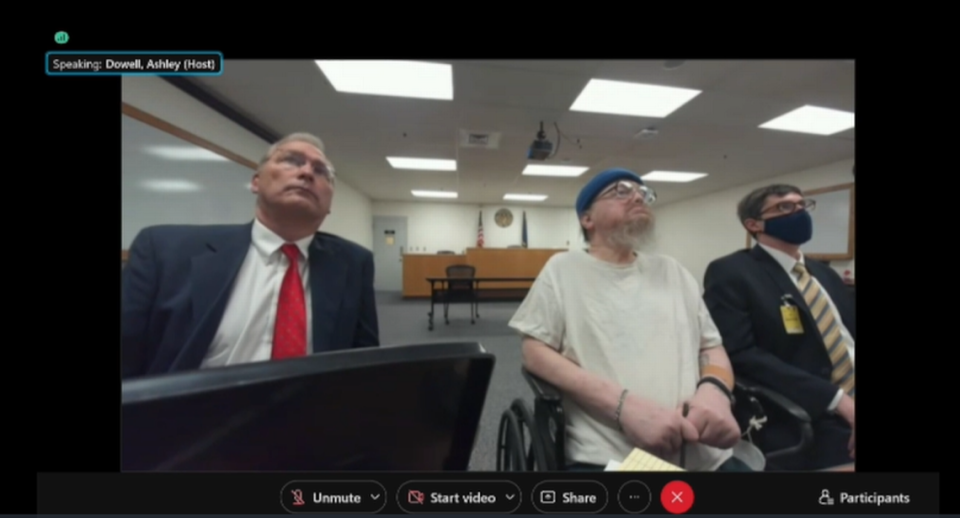Lack of transparency, history of errors means Idaho should hit pause on executions

The pending decision on Gerald Pizzuto’s execution offers the state of Idaho an opportunity to reconsider its position on the death penalty.
The Idaho Commission of Pardons and Parole is deciding whether to proceed with the execution or reduce Pizzuto’s sentence to life in prison.
Pizzuto’s lawyers concede Pizzuto is guilty of the brutal murders, using a hammer to bludgeon to death two victims at a cabin near McCall in 1985.
One of the main factors under consideration is the fact that Pizzuto is terminally ill and likely will die a natural death soon.
This editorial board has urged reducing Pizzuto’s sentence for that reason alone. But other factors are at play here, as well.
Pizzuto’s lawyers have raised issues of Pizzuto’s childhood, which included alleged torture and sexual abuse, as well as his brain damage and mental disabilities.
Separately, lawyers have filed several court challenges, including a petition to the U.S. Supreme Court that argues Pizzuto should be ineligible for execution due to his diminished intellectual capacity.
And a federal court challenge argues that the state’s potential use of lethal injection drugs violates Pizzuto’s rights guaranteed under the Eighth Amendment of the U.S. Constitution, stating the drugs would cause “substantial risk of serious pain and suffering because of his health conditions and medical history.”
These are all valid issues that point to broader concerns with the death penalty.
Further, Idaho has a very recent history of getting it wrong — very wrong.
Christopher Tapp was wrongly convicted for the first-degree murder and rape of Angie Dodge in May 1998 and subsequently spent 20 years in prison before the real killer confessed to the murder. Charles Fain was wrongfully convicted for the 1982 sexual assault and murder of a Nampa child. He spent 18 years on death row before he was released from prison in 2001, after a DNA analysis excluded Fain as a suspect in the killing.
One court challenge in Pizzuto’s case argues that the state formed its lethal injection execution protocols without the proper public input and notification.
Idaho also has a history of being secretive when it comes to executions, especially about the drug cocktail used to execute prisoners.
An earlier complaint on behalf of Pizzuto and fellow death row inmate Thomas Creech alleged the state purchased lethal injection drugs in 2012 with a suitcase full of cash in a Tacoma parking lot.
And in 2019, a judge ordered the Idaho Department of Correction to release several documents on the death penalty, including some that would reveal where the state obtained the lethal injection drugs used in its last execution in 2012. The judge found that the department acted frivolously and withheld the information in bad faith when it denied most of a public records request from University of Idaho professor Aliza Cover in 2017.
Release of information about the drugs used in lethal injections is especially important, as there have been a series of botched executions.
Most recently, a prisoner in Oklahoma convulsed and vomited and shouted a string of obscenities in October before dying of lethal injection, according to the Associated Press. Oklahoma had a moratorium on executions for six years after three consecutive flawed executions or attempted executions in 2014 and 2015, according to the AP.
Because there are so many questions and problems surrounding the death penalty, especially in Idaho, the state should put a hold on any executions moving forward.
After Pizzuto, Idaho has seven other death row inmates awaiting execution.
Other states have hit at least a pause button on executions. The governors in California, Oregon and Pennsylvania have put moratoriums on executions. In all, 23 states do not have the death penalty in any form. The U.S. Justice Department in July halted federal executions while it conducts a review of its policies and procedures.
Unfortunately, Idaho doesn’t appear to have a mechanism, either through the governor or the Commission of Pardons and Parole, to simply pause executions. One option is a citizens initiative, which is a lengthy and difficult process. Another is for the Commission of Pardons and Parole to commute a defendant’s sentence down to life in prison on a case-by-case basis.
It appears the only effective way to put a pause on executions would be through state legislation. The Legislature should take up the issue when lawmakers reconvene in January. But we’re not hopeful Idaho’s Republican-dominated Legislature would do the right thing and address whether the death penalty constitutes cruel and unusual punishment.
Barring all that, the Commission of Pardons and Parole would have to commute a defendant’s sentence down to life in prison on a case-by-case basis.
Since this is the only real option available, that’s exactly what the commission should do until these questions about the protocols and the humaneness of the drugs are resolved.
How it rules in the Pizzuto case will tell us a lot about whether commission members could rule with mercy.
Statesman editorials are the unsigned opinion expressing the consensus of the Idaho Statesman’s editorial board. Board members are opinion editor Scott McIntosh, opinion writer Bryan Clark, editor Chadd Cripe, newsroom editors Dana Oland and Jim Keyser and community members J.J. Saldaña and Christy Perry.

 Yahoo Finance
Yahoo Finance 